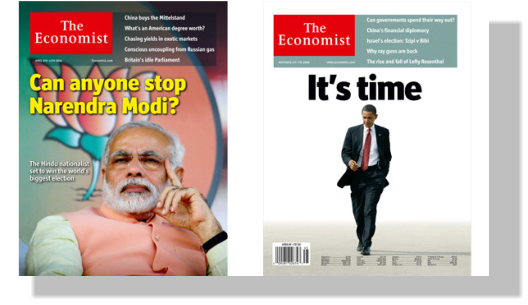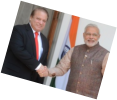










‘Knowledge is power’










The Economist Blames Modi and Supports Rahul as Lesser Evil in
the Eve of the Indian Election 2014: A Rebuttal


MIDDLE EAST
World’s
encyclopedic
knowledge
compacted
in
your
hand





The Economist has used its circulation and opinion might, just before the 2014 elections, to influence the
Indian voters to vote for Rahul Gandhi as a lesser of the two evils. As a result of a plan or just right timing –
almost making it a double whammy – it received heavy Indian media coverage and the consequent intensive
reaction.
latter says he did not commit. Let alone the empty words of politicians that frustrates voters and yet what
Churchill saw essential in a leader, its seeking of a sorry in exchange for support almost sounds like cash
for vote. Furthermore, that from a person whom it believes as one who has killed many, doesn't sound right
by any standard. Far from a sorry, tracing 'A sorry does not make a dead man alive', if Modi has really done
so, he should be punished
according to the prevalent law rather than a sorry and a support from such an influential magazine.
Strangely, akin to its not mincing of words in mixing words with opinion, it seems to have noticed Mr Modi's
pre-election rhetoric but not the post-victory facts: stability and progress. Even then, almost showing
selective deafness geared by the blame
game, it fails to notice the rhetoric of
future plans and development of India
that Modi constantly harps about.
It
accuses the latter
of
whipping up anti-
Muslim
sentiments but it
itself
brings up Babri
Masjid
demolition incident
to whip
up an anti-Modi stance. Furthermore, as
if to divide and rule, it whips up even the
partition tragedy to project India not as a
changed and progressive state but as a
state afflicted with Hindu-Muslim
animosity. Sounding 'endless', it even
drags Pakistani terrorist attacks to keep the
sentiment up.
Although it shows some understanding of the corruption in India in its comparison between self-made Modi
and the dynasty-made Congress and its young leader, it neither sees the enormous sorrow that corruption
has brought to the
Indians, nor does it see the danger of the latter being a novice— coaxed to the field only months ago. India
is not Belgium, nor even France; it is in fact almost as large as the whole of Europe. Controlled, with
difficulty, by even a renowned economist, it needs a well-experienced leader to control the party, the coalition
and the government.
The article is written in good English. But then, noting the word 'even' in the middle of the statement a school
boy could do a better interpretation of what Modi said in the 'puppy' assertion than its erroneous
interpretation brought about by inserting the word 'as'. While this addition itself is wrong, the whipping of
sentiment through it would amount to one whipping up anti 'The Economist' sentiment by airing
mistranslation of Indian texts by the Brits to enforce 'White man's burden'.
Despite having a permanent scribe in Delhi, it puts legal innocence of Modi not as a
fact
observed by its scribe but as an assertion by Modi supporters— as if it were just a
claim. Almost aired by that fact, its other facts about Modi aren't strong either.
Relying on heresy rather than facts, it is sure about Modi erasing evidence of his
crime,
but it does not seem to be sure that erasing of evidence is a major crime by itself, Indian justice system is
independent, judges are not daft and the ruling party equally wants to gun him down.
Furthermore, with half of those killed in 2002 Gujarat riots being Hindus – killed by Modi's troops and by
Muslims – while using 'pogrom' in this instance is not doing justice to the word, and not mentioning Hindus'
plight is not doing justice to the families of dead Hindus, not blaming Modi or even Muslims for the Hindu
deaths is a denial of logical thought that concludes it was a riot. Almost as a shocker to The
Economist, this suggests the alleged sectarian anti-Muslim, Modi, actually killed his own ilk—
the Hindus! A logical interpretation of this killing of Hindus clearly shows Modi not hesitating to
use state machinery to kill his 'own people' to effectively quell the riot.
With him effectively ruling over a riot-free state, in which Muslims also progressed and even freely voted for
him, and his recent assertions tending to unite people of different faiths, ethnicities, castes, etc. under a
futuristic vision as never before, its repeat of the slogan 'Modi is a divisive figure' isn't right. In fact it almost
brings in 'If he divides, he divides people who believe in the media hype and who do research'. With the RSS
seeking a civil code for all, even his association with the latter isn't so divisive.
Even if he strays from his futuristic vision as a PM, with India being dependent on Middle Eastern petrol and
jobs, him being constrained by national and international laws like Tony Blair and Net-equipped globalised
world ogling at his prime ministerial ways, means him causing divisional or other problems is as plausible as
Congress winning this election. The paper expressing fear of future under his leadership is thus pure
scaremongering. With army not treading? to take over power, Indira Gandhi getting flak for the Emergency,
freedom of speech being cherished as in USA and election commission being impartial, even him turning
into a dictator isn't plausible.
With Atom Bomb stopping all wars – even making a boring world as Fukuyama says – Modi can't take India
to war against Pakistan. Far from not knowing what Modi will do, as the article suggests, his assertions make
it pretty clear. Although its beneficiary, Pakistani elite, alone can solve the hostility problem by lessening
Jihadists, if Modi does what he says, through use of efficient manpower and technologies as by Israel, he
can make infiltration futile and lessen hostility.
Even if not good for the arms-selling West, this reduction in hostility is good news for average Pakistanis,
who get no goodies but fear of routine bombings alone.
While its support for a non-winning party, unlike a brilliant U-turn by the USA, shows lack of concern for its
future, its advice given to Modi and Rahul show lack of thought about their implications.
For example, its suggestion to choose a leader other than Modi after election does not see the greater
tragedy of cheating of the people, ransacking of BJP offices and even killing of BJP leaders by the cheated.
With it being a coalition victory and his associates being drenched in corruption, the paper suggesting
victorious Rahul to step back and promote modernisation sounds farfetched. To really modernise the country,
he has to end corruption. This means putting many leaders,
including his family members, in jail. Expecting this lone novice to do the above is unthinkable. Instead, a
rise of unpunished corrupt as a disaster, could easily lead India into a West-dependent state, and a burden
to UN charity agencies. Lesser of the two evils, thus, could easily be the greater.
Like the al Qaeda and the secular rebels fighting in unison against a common enemy Assad, post-secular,
non-divisive Congress president Sonia Gandhi's meet with the Sahi Bukhari of Jama Masjid, unifier-seeking
The Economist suddenly finds itself aligned with the divisive latter in the fight against Modi.
Though a huge reaction makes 'Indians don't give a damn about foreign media' wrong, like the backfiring of
the Sonia Sahi meet, that foreign sentiment backfiring on the paper's goals may not be so wrong.
Finally, freedom of expression is extremely important for the progress of mankind and the paper has the right
to a free speech. But that right has limitations. Airing untruth is one of them. Link to The Economist article
----------------------------
Thanks for reading the article. Please do not forget to send us your comments

WARS


However, like the 'problematic' Indian election
that it tries to cover, it itself is not without problems.
Forgetting actions speak louder than words, almost
like a teenage girl getting carried away by a star-
promising guy, or a gullible American voter
mesmerised by Obama's rhetoric, it just seems to
love politician's words. In this case the word
'sorry' from the prime ministerial candidate of India:
Mr Modi. And that too for a crime which the

Please increase volume to watch this
lady airing amazement @ the 1
author encyclopedia

Modi
Rahul






WOMEN’S POWER: ITS PAST, ITS PRESENT, ITS FUTURE: FEMOCRACY
WEB PAGES
OUR OFFERING
UPLOADED ITEMS
OUR EMAIL
kri200@womenspowerbook.org
QUESTION

































